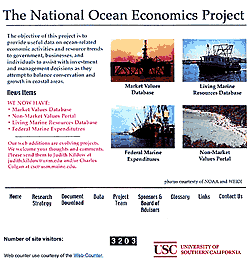|
2. NOPE関連資料
| (拡大画像:270KB) |
 |
This project will provide the first major comprehensive, in-depth analysis of the size and composition of the U.S. ocean economy over the past 30 years. It will form an important element of the U.S. statistical information infrastructure by providing data on ocean-related economic activities and resource trends useful for conflict resolution, investment and management decisions involving, governments, businesses, environmental groups and individuals.
During the Year of the Ocean, government and business reports proliferated, assigning values to coastal resources, real estate, recreation and tourism, transportation and fisheries. Yet often these values are derived with little economic baseline data. As a result, planners in coastal cities and towns struggle to manage unprecedented growth without sound economic data to support their decisions. While businesses multiply to meet the needs of growing populations, little knowledge of economic or environmental carrying capacities support this growth. Waterfront property values climb steeply - along with questions about the implications. Beach closures, resulting from storm drain overflows, hurt local economies, but no one knows the true cost or the value of those beaches.
Helping to answer these questions and many others is the task of this four-year project to determine the contribution of the coast and ocean sectors to the US economy. Work over the past 20 years has demonstrated that it is possible to construct a framework of economic valuation and measure the different sectors of the ocean economy. Currently the pieces to this puzzle are scattered and inconsistent. Past studies have valued ocean-related GNP from 2.6% to 35% of total U.S. GNP - clearly a problem if we are to use this type of data to decide how and where to invest resources.
Balancing development and growth in coastal areas with the preservation and management of our natural resources is a challenging task - having the economic information necessary to make these decisions is critical.
At the root of the problem is the limited scope of the national income accounting system of the United States - the system from which measures such as GDP and GNP are derived. These National Income and Product Accounts (NIPA) tabulate the overall size of the U.S. economy, but do not provide detailed information for either the market sector or recreational and environmental resources.
Our project team is assembling four broad categories of data to draw a complete picture of the economic values associated with the ocean:
1. Those derived primarily from NIPA and the source data sets used to measure GDP, which will allow the value of the ocean and associated industries to be compared with other subsets of economic activity.
USC Wrigley Institute for Environmental Studies
Dr. Judith Kildow, Principal Investigator
The data will include employment, expenditures, revenues, and selected multipliers for these ocean-related industries:
| ・Eoffshore energy and minerals |
・EIiving marine resources (including fishing and aquaculture) |
| ・Ecoastal tourism and recreation |
・Ecoastal construction, restoration, repair and maintenance |
| ・Ecoastal real estate |
・Emarine science, research and technology development |
| ・Emaritime transportation |
・Eship and boat building |
2. Regional accounts will be established for coastal states, as well as subdivisions by county and other jurisdictions. This category encompasses ocean-related economic values that are tied to specific coastal locations through the myriad interactions of the economy.
3. The value of the ocean as "capital": its ability to produce income in the future. This allows assessment of the oceans' ability to provide a sustainable flow of economic value involving:
| ・offshore oil and gas; |
・fisheries; |
| ・other marine minerals; |
・other living marine resources and aquaculture. |
4. Values that are not measurable in market transactions but which are important nonetheless, such as a day at the beach. This extends the national income accounting approach, providing a greater understanding of the economic values of the ocean not based on market transactions. For example: coastal and marine amenities; and the assimilative capacity of coastal and ocean waters.
This project will provide the first major comprehensive, in-depth analysis of the size and composition of the U.S. ocean economy over the past 30 years.
Together this information will describe the "ocean economy" from the perspective of traditionally measured economic activity as well as the values not measured in market transactions. One challenging task of this project will be to integrate traditional ocean economic measures with the coastal and ocean values not included in the national income accounts. The consistent, integrated accounting framework we propose to develop is needed to make this information useful to decision-makers.
Once formed, this information system will be an ongoing, updated source of objective and accurate data from which all of the players in marine-related fields may build their cases. The enormity of this task precludes generating new economic data. Rather, this will be a meta-study, drawing from hundreds of data sources and assessing them for reliability and relevance. The end product will be a set of accounts for the coast and coastal ocean easily accessible to the public over the Internet.
PROCESS AND ADVISORS
Dr. Judith Kildow, USC Wrigley Institute for Environmental Studies is the Principal Investigator; Associate Investigators are Prof. Charles Colgan, Muskie School of Public Service. Univ. of Southern Maine and Dr. Hauke Kite-Powell, Marine Policy Center, Woods Hole Oceanographic Institution.
The National Advisory Board includes Michael
Hanemann, Univ. of California, Berkeley; Marc Hershman, Univ. of Washington; Mary
Hope Katsouros, the Heinz Center; Charles Kolstad, Univ. of California. Santa
Barbara; Roger McManus. Center for Marine Conservation; Giulio Pontecorvo, Columbia
Univ; Robert Solow, MIT; Lester Thurow, MIT; and Judith Weis, Rutgers University.
For further information contact:
Dr. Judith Kildow, Principal Investigator
Tel: 213.740.5539 or jkildow@usc.edu
|